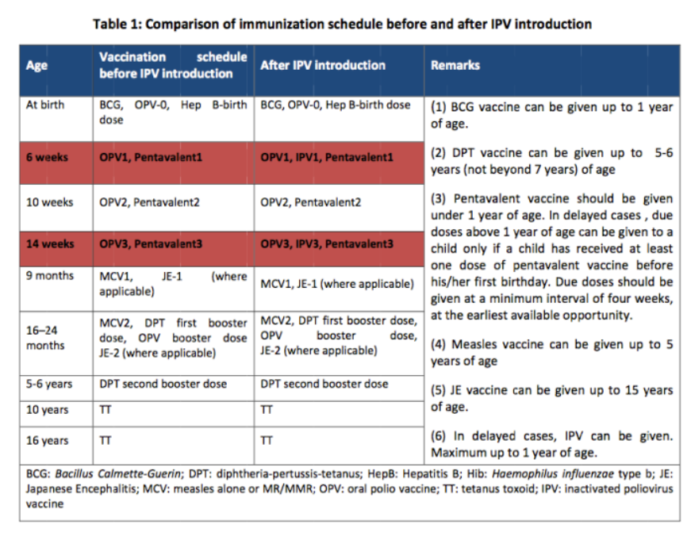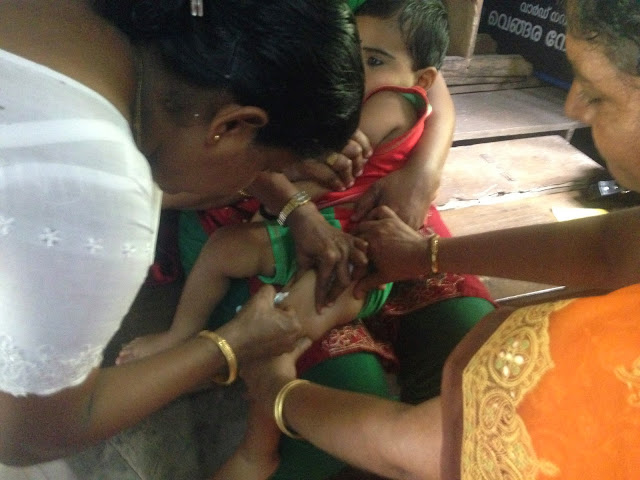Vaccines are by all means one of the most important achievements of Public health care in the whole planet. Immunization is the process of fortifying an individual’s immune system against an immunogen (antigen/agent causing the disease).
UPDATE : As newer vaccines are being introduced in India, this post will be updated regularly. So, I’d recommend you to bookmark this page for easier access the next time you’re looking for the vaccination schedule. Last Updated – July, 2016
The Universal Immunization Programme (UIP) was launched initially in 1985 and is one of the world’s largest Immunisation Programmes taking into consideration the huge target population and the mere number of immunisation sessions that are being conducted every day all over the country.
The UIP was initially aimed at preventing 6 vaccine preventable diseases which included Poliomyelitis (or simply Polio), Diphtheria, Pertusis (whooping
cough), Tetanus, Mumps and Measles. Hepatitis B was added to the UIP in 2007. Very recently, in 2014, the Government of India announced to add 4 more vaccines to the UIP namely, the Rotavirus vaccine, Rubella, Japanese Encephalitis and the Injectable Polio vaccine. The schedule of UIP is –
- BCG (Bacillus Calmette Guerin) 1 dose at Birth (upto 1 year if not given earlier)
- DPT (Diphtheria, Pertussis and Tetanus Toxoid) 5 doses; Three primary doses at 6,10,14 weeks and two booster doses at 16-24 months & 5 Years of age
- Pentavalent vaccine (H. Influenza B, Hepatitis B + all the DPT ie 5 in one vaccine) schedule is same as DPT vaccine
- OPV (Oral Polio Vaccine) 5 doses; 0 dose at birth, three primary doses at 6,10 and 14 weeks and one booster dose at 16-24 months of age
- IPV (Inactivated Polio Vaccine) 2 doses : first with OPV-1 and second with OPV-3 (i.e 6 and 14 weeks respectively) – NEW arrival from November 2015 onwards.
- Hepatitis B vaccine 4 doses; 0 dose within 24 hours of birth and three doses at 6, 10 and 14 weeks of age.
- Measles 2 doses; first dose at 9-12 months and second dose at 16-24months of age
- TT (Tetanus Toxoid) 2 doses at 10 years and 16 years of age
- TT for pregnant woman two doses or one dose if previously vaccinated within 3 Year
Now that you know what UIP is, let me tell you how this programme is being conducted at the grass-root level of the rural Kerala.
Click here for more details about the Polio vaccines.
Below is a table of how India’s routine immunization programme has changed with the introduction of IPV in 2016 :-
If you’ve any difficulty in understanding the above chart, let me know.
NOTE : The vaccination schedule recommended by the Indian Academy of Paediatrics (IAP) is different from the one followed by the Ministry of Health, Government of India. The former one includes additional vaccines like the HPV, RV, Typhoid vaccine, Chicken Pox, Cholera, PCV etc. If you want to have a look at the IAP vaccination schedule, simply follow this link.
Every hospital coming under the Government has to conduct Routine Immunization on a selected day of the week. In our PHC (Primary Health Centre) Wednesday is the ‘Immunisation Day. We have a separate building for the MPHWs (Multi Purpose Health Worker) and in that building we have arranged a room just for “Immunisation’. To make it child friendly we have painted cartoon characters in bright colours on the walls and doors of the room. A doctor would be present at the hospital during the time of Immunization, The vaccination process is carried out by trained JPHNs (Junior Public Health Nurse).
Every Wednesday, parents (mostly mothers) bring their babies and children to the hospital to vaccinate them and thus protect them from the deadly diseases. The ASHAs (Accredited Social Health Activist) and the MPHWs (both male and female) plays a vital role in canvassing these mothers and motivating them to promote immunisation in their respective areas. Some anxious mothers asks for the doctor’s opinion before Immunisation when their children have minor ailments. Considering the religious beliefs and the topography of our Village, the number of children who gets vaccinated every Wednesday is satisfactory. Needless to say, we have Routine Immunization programme conducted at the second PHC (Fisheries hospital) too!
 |
| Out-Reach Immunization session of PHC Muttam going on at an Anganwadi |
Apart from the ‘Routine Immunization’ conducted at the hospitals, we organise and conduct‘Out-Reach’ Immunization programmes too. In this programme, a team of health workers along with the doctor, visits Anganwadis or Clubs or Libraries etc in the peripheries of the village so that the parents there can bring their children to that area on that specific day to get vaccinated. We conduct 3 such Out-Reach Immunization programmes every month covering 7 remote areas of the village. This way we help the people in remote areas of the village by cutting down on their transport expenses to the hospital. This programme also makes sure of the field visit duties of the Medical Officer.
Every PHC has an appropriate storage facility for the vaccines which is very important for the vaccine potency. Potent vaccines are crucial for the successful implementation of the National Programme. A proper ‘Cold Chain’ mechanism is maintained to ensure this in every level of primary health care starting from the PHC. But I don’t think this is the case in Private Hospitals. We will talk more on this topic in another post.


You have not given information of penta
Hello Nitin,
Schedule of the Pentavalent vaccine has been added. Thanks for the heads up!
Dear Dr Prasoon – thank you for the helpful information on the free immunisation programme in India. I am a public health doctor working for an NGO that has a project in India. I would be interested to know if young adults who come into our care with unknown, or incomplete, vaccination schedules are still eligible for free immunisations ? If they are eligible for free vaccinations;
– where would they access these?
– is there a schedule that has been developed that identifies, on an age-specific basis, what vaccinations they should receive?
many thanks
Hello Dr Tina,
As far as my knowledge goes, the only vaccines that are given for young adults under the national immunization schedule in India are the 15 years Tetanus Toxoid booster and the Rubella vaccine. In some states, the state government has implanted certain projects to distribute HPV vaccines, but I’m not sure whether such projects are still going or not. TT and Rubella vaccines can be accessed free of cost at any government hospital (PHC, CHC or higher centres).
Regards
Hello Dr. Prasoon, I have given my baby bcg and hep B vaccination from private hospital, and now I have to give him dtp at one and half month, which I am planning at government hospital. I inquired at dtp at a government hospital, where the lady told me we give penta injection, and that too just once, I asked her that private hospital gives three dose, she said we just give once which is sufficient, now I m little confused whether one dtp injection at one and half month would be sufficient for my baby. Plus she said it contains hib vaccine too. Can u just inform me how many vaccine do Govt give, and how much are required. If there are some extras which can be given at extra cost.
Hello Madhu,
Your baby has to be given 3 primary doses of Pentavalent vaccine at 6, 10 and 14 weeks age. Just one dose of the pent vaccine is insufficient and I don’t know why the government hospital staff told you such a statement. Maybe, there’s shortage of the vaccine there! But, you can go for the full 3 doses at any private hospital. Additionally, IPV (polio vaccine), PCV (pneumococcal) vaccine and rotavirus vaccines can be given along with the 3 doses of pent vaccine. In Kerala, IPV and Penta are given at one and half months along with OPV at all government hospitals.
Hope this answer cleared your doubts.
Regards,
Dr Prasoon
hello dr prasoon, i have given 3 pentavelent doses to my child at 6, 10 and 14 week but i am nor aware that dpt also given at 16-24 month. now my daughter is 2 year 2 month old can i give her dpt now. and i doesn’t give her typhoid or ipv till now. is they necessary ?
Yes, DPT booster can be taken even after 2 years.. I’d also recommend you to give the IPV doses, but Typhoid vaccine is not necessary. Hope she has already got the MMR or MR shot.
Dr. Prasoon,
Thank you for a very informative post. Just wanted to know, if all these mentioned vaccines under the immunization schedule available for free at government hospitals across India? Or do the parents have to bear the cost of the vaccines, albeit on a subsided cost?
Hello Mr. Rao,
All the vaccines mentioned in this post (unless specifically flagged) are freely available in government hospitals across India.
Thank you very much Doctor for clarifying my doubt. How can I reach you to discuss a potential project in relevance to immunization in TELENGANA? I would like to gain some insights from a learned medical professional such as yourself.
Regards,
Raghavendra Rao
Hi I am in Gurgaon and vaccinations are costing me a lot. I need support in getting the vaccination for free in Gurgaon region.
Have you tried contacting the government hospitals in your area?
PCV is really a ripoff from vaccine manufacturers. Since it is not available till now on 23/11/2017 at government hospitals. One shot itself costs around Rs.4000/ and a total of 3 doses are required in different time. so approx 12000/ in tital
Yes, PCV is indeed very costly. The 10 talent PCV can be bought from direct distributors for 1400 INR per dose. A total of 3 doses plus 2 booster doses of PCV are required to be exact.